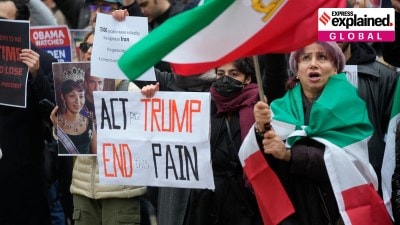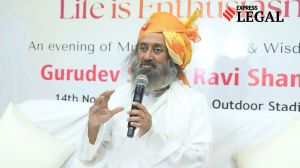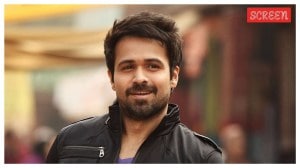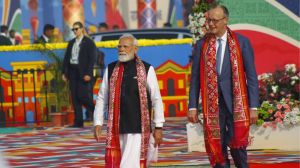Iraq takes centrestage
In the end, it was a real debate: sharp, scrappy and defining, just what the nation seemed to be yearning for during a wartime election camp...

In the end, it was a real debate: sharp, scrappy and defining, just what the nation seemed to be yearning for during a wartime election campaign. Again and again, President Bush defended his conduct of the war in Iraq, insisting, 8216;8216;there must be certainty from the US president.8217;8217; Over and over, Sen. John Kerry asserted that Bush had led the country into a debacle in Iraq and it was time for a 8216;8216;fresh start, new credibility8217;8217; in foreign affairs.
From the very first question of their 90-minute exchange, Kerry was determined to show, as he put it, that 8216;8216;I can make America safer than President Bush has made us.8217;8217; He was cool, respectful, rational in offering a detailed brief that Bush had embarked on a diversion from the war on Al Qaeda and global terror by invading Iraq, and his answers never exceeded the time limits negotiated by both sides. By the time the debate ended, Kerry appeared to have accomplished his primary goal for the evening: establishing himself as a plausible commander in chief.
Bush, who seemed defensive and less sure of himself at the outset, quickly gained his footing, repeatedly charging that Kerry8217;s record was inconsistent and that he lacked the resolve to defend the nation. He was just as relentless as Kerry, and perhaps more emotional, never ceding ground to Kerry in his insistence that he had used every available means to defend the nation in the aftermath of 9/11. At times, he seemed to lean into the camera, pursing his lips, at some pains to disguise his apparent exasperation at Kerry8217;s attacks, insisting, as he did at the outset, 8216;8216;People know where I stand.8217;8217;
At one point, Bush burst out a spontaneous answer to a question that Kerry had posed only rhetorically, declaring before the moderator, Jim Lehrer, had recognized him, 8216;8216;Of course we8217;re doing everything we can to protect America.8217;8217; At another juncture: 8216;8216;Of course I know Osama bin Laden attacked us,8221; not Saddam Hussein.
The two men agreed the threat of unconventional weapons in the hands of rogue actors would be the biggest challenge facing either of them as president 8212; and that Saddam had seemed to pose such a threat. They agreed the US could not pull out of Iraq precipitately. But they disagreed on virtually everything else, from how to handle genocide in the Sudan to nuclear proliferation in North Korea and Iran.
Facing by far the largest national audience of the campaign to date, with polls suggesting that something between one-fifth and one-third of voters might be influenced by Thursday night8217;s encounter, Kerry was at pains to rebut the Bush campaign8217;s portrayal of him as a fickle flip-flopper who has repeatedly changed his position on the war in Iraq and would cede too much control of the nation8217;s defenses to foreign allies.
When Bush noted that Kerry had voted against an 87 billion appropriation for military and reconstruction operations in Iraq and Afghanistan, then said he had initially voted for another version, Kerry8217;s rebuttal could hardly have been crisper. 8216;8216;Well, you know, when I talked about the 87 billion, I made a mistake in how I talk about the war,8217;8217; Kerry said. 8216;8216;But the president made a mistake in invading Iraq. Which is worse?8217;8217;
Bush was just as blunt in his insistence that Kerry8217;s criticism of the conduct of the war had demoralized the troops and the interim Iraqi leaders struggling to impose some stability on that country. 8216;8216;What kind of message does it say to our troops in harm8217;s way 8216;wrong war, wrong place,wrong time,8217;8217;8217; Bush said, echoing Kerry8217;s recent formulation. 8216;8216;That8217;s not what a commander in chief says when you8217;re trying to lead troops.8217;8217;
As the challenger, Kerry had the higher burden, and his performance was more disciplined and controlled than usual. He spoke plainly, politely, but did not shrink from direct and pointed criticism of Bush8217;s policies. Kerry pointed out that the president8217;s father, in his memoirs, said he did not go into Iraq 8216;8216;because there was no viable exit strategy.8217;8217; 8220;And he said our troops would be occupiers in a bitterly hostile land. That8217;s exactly where we find ourselves today,8217;8217; Kerry said. 8212;NYT
|
You Lie vs You Fudge: The Great Iraq Divide
|
||||
| nbsp; |
In the first 90-minute election debate between President George Bush and Senator John Kerry on Thursday night, almost 70 minutes were devoted to Iraq. In the end, network pundits said, Kerry emerged with an edge THE DEBATE |
nbsp; | ||
- 01
- 02
- 03
- 04
- 05


 8226; Iraq war was a 8216;8216;grand diversion8217;8217; from the more important war against Al-Qaeda
8226; Iraq war was a 8216;8216;grand diversion8217;8217; from the more important war against Al-Qaeda  Bush looked somewhat defensive in the beginning while Kerry got off to a very good start: Bob Schieffer, CBS
Bush looked somewhat defensive in the beginning while Kerry got off to a very good start: Bob Schieffer, CBS 




























